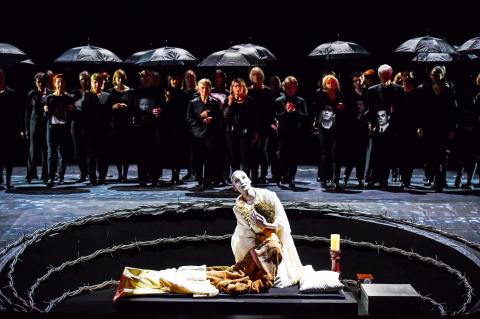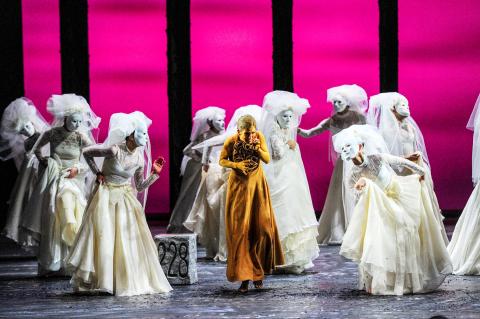After seeing Lin Mei-hong’s (林美虹) Schwanengesang (“Swan Song”) at the National Theater in 2010, I bemoaned the fact that this incredibly talented Yilan-born choreographer’s dance-theater works had never been seen in Taiwan before and voiced the hope that local audiences would have the chance to see more.
It took eight years before she was able to return, at the head of a different company, bringing TANZLIN.Z to perform The Little Mermaid at the National Taichung Theater in November last year.
Now, just seven months later she is coming back with the company, which will be performing one of her most critically acclaimed productions, Die Brautschminkerin (新娘妝), at the National Kaohsiung Center for the Arts (Weiwuying) next month at the invitation of Minister of Culture Cheng Li-chiun (鄭麗君).

Photo: Courtesy of Dieter Wuschanski
Lin created Die Brautschminkerin, which premiered in 2011, for her former company, the Tanztheater des Staatstheaters Darmstadt, and revived it two years ago for the Linz, Austria, troupe.
Die Brautschminkerin is based on Taiwanese writer Li Ang’s (李昂) short story Rouged Sacrifice (血妝彩祭), inspired by the horrors of the 228 Massacre in 1947.
Rouged Sacrifice tells of a woman whose husband is killed on their wedding night, and how she struggled to support herself and their son by working as a bridal make-up artist.

Photo: Courtesy of Dieter Wuschanski
The story is set in 1997 and examines the massacre and its repercussions through the eyes of two women, Mother Wang, whose husband was taken away by military police on their wedding night and executed, and a writer who wants to make a documentary about the massacre.
Central to Li’s story is that Taiwan had been suffering in silence for 50 years over the massacre, both the living and the ghosts or souls of the victims. A second key element is the repression of marginalized groups in Taiwan, for Mother Wang has been estranged from her son for years, having not spoken to him since learning that he was gay.
The two protagonists in Die Brautschminkerin are the mother of the past — the young bride who lost her groom on their wedding night — and the mother of the present — who has to confront the death of her son.
Haunting the stage are brides in white and groups of young men, while later a crowd of black-clad people of all ages wearing pictures of missing relatives, moving in silent protest against the world’s injustices.
Lin said Die Brautschminkerin allows women to express their pains, regrets and memories, and that she wanted to give a voice to those who are silenced, who are condemned to darkness.
However, she has said the piece is not just about Taiwanese history, but about the feelings of all those who have lived through coercion and the memories of those who have survived it, be it Spain in the 1930s, the atrocities of Nazi Germany to what is happening in many countries in the present day.
“One’s responsibility as an artist lies in experiencing the pulse of society and taking an interest in universal human values,” Lin said a talk at Weiwuying on June 1, “When Words Become Dance: Literature, Music and Images in Die Brautschminkerin.”
She also told the audience that she had been unsure about bringing Die Brautschminkerin to Taiwan, but as the European refugee crisis erupted in 2017, she realized that trauma and pain can occur anywhere.
Li also took part in the June 1 talk, and recounted how she met Lin at an international book festival, where they bonded over their common concern for human rights.
She told the audience that not only had she been in the audience of the 2011 premiere of Die Brautschminkerin, but has attended several other performances as well, including the premiere of the revival in February 2017.
Lin also drafted playwright and opera singer You Yuan-kiang (游源鏗), or A-kiang (阿鏗) as he is more commonly known, and France-based musician Yo Li-yu (游麗玉), famed for his gu-qin (古琴) compositions to give a Taiwanese flavor to the score for the production.
German arranger Michael Erhard pulled the disparate musical elements together, while Dirk Hofacker created the sets and costumes, as he did for The Little Mermaid.
Die Brautschminkerin runs about 80 minutes.

On April 26, The Lancet published a letter from two doctors at Taichung-based China Medical University Hospital (CMUH) warning that “Taiwan’s Health Care System is on the Brink of Collapse.” The authors said that “Years of policy inaction and mismanagement of resources have led to the National Health Insurance system operating under unsustainable conditions.” The pushback was immediate. Errors in the paper were quickly identified and publicized, to discredit the authors (the hospital apologized). CNA reported that CMUH said the letter described Taiwan in 2021 as having 62 nurses per 10,000 people, when the correct number was 78 nurses per 10,000

As we live longer, our risk of cognitive impairment is increasing. How can we delay the onset of symptoms? Do we have to give up every indulgence or can small changes make a difference? We asked neurologists for tips on how to keep our brains healthy for life. TAKE CARE OF YOUR HEALTH “All of the sensible things that apply to bodily health apply to brain health,” says Suzanne O’Sullivan, a consultant in neurology at the National Hospital for Neurology and Neurosurgery in London, and the author of The Age of Diagnosis. “When you’re 20, you can get away with absolute

May 5 to May 11 What started out as friction between Taiwanese students at Taichung First High School and a Japanese head cook escalated dramatically over the first two weeks of May 1927. It began on April 30 when the cook’s wife knew that lotus starch used in that night’s dinner had rat feces in it, but failed to inform staff until the meal was already prepared. The students believed that her silence was intentional, and filed a complaint. The school’s Japanese administrators sided with the cook’s family, dismissing the students as troublemakers and clamping down on their freedoms — with

As Donald Trump’s executive order in March led to the shuttering of Voice of America (VOA) — the global broadcaster whose roots date back to the fight against Nazi propaganda — he quickly attracted support from figures not used to aligning themselves with any US administration. Trump had ordered the US Agency for Global Media, the federal agency that funds VOA and other groups promoting independent journalism overseas, to be “eliminated to the maximum extent consistent with applicable law.” The decision suddenly halted programming in 49 languages to more than 425 million people. In Moscow, Margarita Simonyan, the hardline editor-in-chief of the